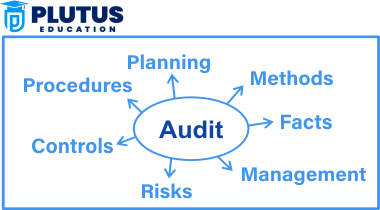Auditing is defined as an independent and systematic examination of financial statements and records to ensure that these are correct, complete, and presented in compliance with all applicable laws and regulations. An audit may be carried out by an internal or external auditor in order to give an objective review of an organization’s financial workings. This review would help the stakeholders, including investors, creditors, and management, rely on the financial reports in their decision-making processes. Auditing has been regarded as essential for contemporary business since it enhances transparency, credibility, and compliance with legal and regulatory requirements.
Auditing encompasses processes, such as document examination, checking the effectiveness of internal controls, and financial data analysis. It mainly strives to ascertain whether the financial statements are representative of the enterprise’s actual financial status. Hence, reducing the possibilities of miscalculations and frauds.
What is Auditing?
Auditing is an exercise of studying a company’s financial records, operations, and other pertinent documents to ensure that the reported financial statements are credible and compliant with applicable standards and regulations. In essence, auditing is a systematic process for ensuring proper transparency, truthfulness, and reliability in a company’s financial reporting. Those who conduct audits are trained professionals presenting an independent opinion on the state of the financial statements.
Features of Auditing
Auditing is defined by several key features:
- Systematic Process: It follows through a pre-complied set of rules and standards, ensuring consistency and completeness in every engagement.
- Independence and Objectivity: The Auditors must possess no inherent or apparent conflict of interest that may have a bearing on the auditor’s objectivity in reporting the results of the audit.
- Evidence-Based: The auditor collects evidence from sources of information, such as financial records, contracts, invoices, and interviews with management and staff members, to support the conclusion reached.
- Legal and Ethical Compliance: Auditing ensures the observance of organizations with accounting and legal rules. The authors further included checking corporate policies and internal controls.

Importance of an Audit
An audit serves as a critical mechanism for maintaining the integrity of financial information in organizations. It is essential for several reasons:
- Enhancing Credibility: Audits assure investors and shareholders regarding the credibility of the financial statements.
- Compliance with Regulations: A number of regulatory bodies expect audited companies to periodically make themselves available in order to demonstrate the fact that they are complying with laws, regulations, and accounting standards like IFRS (International Financial Reporting Standards) or GAAP (Generally Accepted Accounting Principles).
- Fraud Prevention/Detection: Audit is used as a prevention measure against fraudulent activities. The audit process encompasses a detailed examination of financial statements and internal controls that may result in the detection of fraud.
- Better-Informed Decision Making: Consistent and reliable audited financial statements provide the stakeholders with the information needed to make prudent decisions in investment, lending, and management.
- Operational Efficiency: Audits help unveil inefficiencies in business processes and suggest improvements leading to increased operational effectiveness.
Importance of Audits in Financial Reporting
Here’s a simple graphical representation of the importance of audits in ensuring the reliability of financial statements:
| Importance of Audits | Outcome |
|---|---|
| Trust and Transparency | Greater investor confidence |
| Compliance | Adherence to laws and regulations |
| Fraud Detection | Lower fraud risk |
| Decision Support | Improved business decisions |
| Efficiency | Enhanced operational effectiveness |
Purpose of an Audit
The purpose of an audit is not merely to verify the numbers presented in financial statements but also to provide insights into the overall health of the organization. The main objectives include:
- Detection of Errors and Fraud: Auditors go through the accounting documents and transactions to identify errors or frauds.
- Re-statement of Financial Statement: The auditors should think that having regard to the best information available to them and taking into account the assumptions involved, the financial statements give a true and fair view and are appropriately presented in all respects under approved accounting standards.
- Testing Internal Controls: The auditor finds internal control weaknesses that might lead to a threat to financial reporting and recommends improvement.
- Assurance to Stakeholders: A clean audit report assures stakeholders that they may confidently rely on the financial disclosure of the corporation for decision-making purposes.
Sub-Purpose of an Audit
- Ensuring Proper Bookkeeping: This will ensure that the right bookkeeping has been done by evaluating the accuracy of financial records, which would ensure that all entries are noted correctly.
- Legal Compliance: Audits check whether companies comply with all tax laws, corporate governance rules, and other specific regulations.
- Risk Mitigation: Audits help in recognizing potential financial risks and recommend an appropriate mitigation strategy.
Scope of Audit
The scope of an audit refers to the areas under which the auditor will focus his attention during the process. This scope is determined by the nature, size, and complexity of the business and by the terms of engagement by the auditor. These often comprise:
- Verification of Transactions: Auditors verify a sample of transactions. Therefore knowing whether they are accurate and accounting policies.
- Review of Financial Statements: An auditor reviews financial statements, such as balance sheets, profit and loss statements, and cash flow statements to confirm their accuracy.
- Review of Internal Controls: The auditors evaluate the internal controls on recording and reporting of financial transactions to verify their effectiveness.
- Legal and regulatory compliance: The auditor checks whether the firm complies with relevant laws, accounting standards, or regulations.
- Materiality: Although it sounds like a technical term, “materiality” basically means identifying whether the misstatements are large enough to affect the readers of the financial statements.
Objectives of Auditing
The primary and secondary objectives of an audit are crucial for understanding its comprehensive role in business governance.
Primary Objectives
- True and Fair Representation: The fundamental objective of an audit is that financial statements report on an organization’s financial activities or position with a true and fair view.
- Fraud Detection: The auditor attempts to detect fraud by looking into the financial statements along with the internal controls.
- Detection of Errors: This objective relates to establishing whether any possible material misstatement has occurred due to error or fraud.
Secondary Objectives
- Adherence to Accounting Standards: Auditors examine whether the statements conform to appropriate accounting standards, such as International Financial Reporting Standards or Generally Accepted Accounting Principles.
- Performance Review: An audit might provide details about the efficiency of a company’s financial management and working practices.
- Recommendations for Improvement: After reviewing the internal controls and processes, auditors provide recommendations for efficiency with minimum risk.
Types of Auditing Objectives
- Financial Objectives: Pay attention to the accuracy of financial records.
- Compliance Goals: The organization is supposed to keep in line with the relevant legislation and regulations together with the company’s policy.
- Operations Goals: Observe the strengths and weaknesses of internal control and the operation.
Advantages and Limitations of Audit
Audits provide multiple advantages but also come with inherent limitations.
Advantages of Audits
- Enhanced Credibility: The audits enhance the credibility of financial statements by their independent verification of accuracy.
- Detection of fraud: Auditors are trained in detecting fraud-related indicators. Thus, it acts as a sound tool to ensure the protection of assets.
- Improvement in operational efficiency: Audits help determine the weaknesses in internal controls and processes for improvement of operational efficiency.
- Increased Stakeholders’ Confidence: Investors, creditors, and other stakeholders have increasing confidence in the business when its financial statements are independently audited.
- Regulatory Compliance: Audits verify that the businesses attained legal and regulatory standards to evade penalties and fines.
Inherent Limitations of Audit
- Sampling Risk: The auditor will, in most cases, check only a sample of transactions. So there is always a possibility of passing some errors or fraud.
- Subjective Judgment: The judgment of the auditor may be subjective and can differ from one auditor to another.
- Limitations of Internal Controls: Strong internal controls cannot eliminate all risks, and therefore, some fraud or errors may not be discovered.
- Time and Cost Constraints: Audits can consume a lot of the time and money involved in their process.
Advantages vs Disadvantages of Auditing
| Advantages | Disadvantages |
|---|---|
| Enhanced credibility | Subjective judgment |
| Fraud detection | Sampling risk |
| Process improvements | Internal control limitations |
| Regulatory compliance | Time and cost constraints |
Audit is a process that helps companies add value because their financial statements are accurate, reliable, and in line with laws and regulations. As a result of auditing, fraud detection has improved, and stakeholders have been given enough confidence to make informed decisions. Even though there are many benefits of auditing, some inherent limitations are also associated with auditing, such as sampling errors and personal judgment. Despite these limitations, the function that audit plays in the corporate world can by all means not be dismissed because it is the one element acting as a basis for transparency and accountability.
Introduction to Auditing FAQs
What is the primary purpose of an audit?
The primary purpose of an audit is to verify the accuracy and fairness of a company’s financial statements and ensure compliance with applicable accounting standards.
How does auditing detect fraud?
Auditors use a systematic approach to review financial records and internal controls, which helps identify discrepancies, irregularities, or fraudulent activities.
What are the limitations of an audit?
Audits can be limited by sampling, subjective judgment, and the inherent limitations of internal controls, which means that not all errors or fraud might be detected.
Why is audit independence important?
Independence ensures that the auditor’s findings and opinions are unbiased, making the audit credible and reliable for stakeholders.
How often should a company be audited?
Most companies are required to undergo an annual audit, although some may conduct audits more frequently depending on their needs and regulatory requirements.


